The World Health Organization (WHO) has released a new report highlighting the urgent need to address dementia in refugee and migrant populations. Titled Dementia in Refugees and Migrants: Epidemiology, Public Health Implications, and Global Health Responses, the report compiles global research on the challenges faced by displaced individuals with dementia. This is the sixth publication in WHO’s Global Evidence Review on Health and Migration (GEHM) series, aiming to inform policies that protect vulnerable groups.
Dementia affects more than 57 million people worldwide, with nearly 10 million new cases each year. It is the seventh leading cause of death and a major factor in disability among older adults. While no cure exists, certain lifestyle changes, including physical activity and social engagement, can help manage symptoms. However, people with dementia often experience discrimination and difficulty accessing care. These challenges are even greater for refugees and migrants, who face additional barriers such as language difficulties, lack of culturally appropriate services, and migration-related stress.
Forced displacement due to war, economic instability, and climate change has led to a growing number of older refugees and migrants. Despite this, dementia remains overlooked in health policies and emergency response plans. Limited research on dementia prevalence in these populations further complicates efforts to provide adequate care. Without sufficient data, health systems struggle to tailor services that meet their unique needs.
Dr. Santino Severoni, Director of WHO’s Department of Health and Migration, emphasized the importance of including dementia care in migration and public health policies. “Refugees and migrants have the same right to health as everyone else, yet they often face systemic barriers to care. Urgent action is needed to ensure timely diagnosis, effective treatment, and proper support,” he said.
The WHO report outlines several key policy recommendations, including:
- Inclusion in policies: Governments should integrate refugees and migrants into national dementia-related health frameworks.
- Awareness campaigns: Communities need education on dementia, especially in refugee settings, to foster understanding and support.
- Culturally tailored care: Health interventions should consider cultural and linguistic factors to ensure accessibility.
- Improved diagnosis and treatment: Health professionals working with refugees should receive training to enhance dementia care.
- Support for caregivers: Governments should provide legal protections and training for those caring for dementia patients in displaced communities.
- Data collection and research: Countries need stronger surveillance and research efforts to better understand dementia’s impact on refugees and migrants.
This report, developed in collaboration with WHO’s Department of Mental Health, Brain Health, and Substance Use, highlights the pressing need for global action. As migration continues to rise, addressing dementia in these populations is crucial to ensuring equitable healthcare for all.

